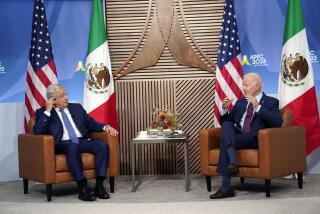Terrorism, Not Trade, at Top of APEC Agenda
- Share via
CABO SAN LUCAS, Mexico — An ocean away from the most volatile parts of their region, leaders of Pacific Rim governments meeting here this weekend are expected to adopt an ambitious U.S. plan to dry up financing for terrorists and strengthen security procedures for air travel and shipping.
The plan would require the 21-member Asia-Pacific Economic Cooperation group, or APEC, to send passenger lists to one another ahead of the arrivals of aircraft and ships. It would also oblige them to inspect shipping containers before they leave for other APEC members’ ports, tighten baggage screening at airports and reinforce cockpits. All are steps the United States is starting to take at home.
A draft of the voluntary accord -- awaiting approval by President Bush and the leaders of China, Indonesia, Japan, Mexico and other governments -- also pledges to “suppress the financing of terrorism” through better monitoring of charities and nonprofit organizations as well as informal banking networks known in the Muslim world as hawalas.
Foreign ministers of the APEC members endorsed the U.S. proposal at a meeting here Thursday but left the timing of the measures and other details up to presidents and prime ministers who begin a two-day summit here today.
U.S. Secretary of State Colin L. Powell called it “a package of bold joint actions to make the flow of trade, finance and communication more secure.” He said the United States and other wealthy countries would help poorer ones pay for the new initiative, which would cost billions of dollars.
APEC members have a total population of 2.6 billion and account for nearly half the global economy. The group was formed in 1989 as a trade association for the nations of Asia and the Americas. But its two annual gatherings since the Sept. 11 attacks on the United States have focused more on terrorism than tariffs.
Last year’s summit in Shanghai came six weeks after the attacks. This year’s gathering at the Mexican beach resort of Cabo San Lucas, ringed by warships in the Gulf of California and hundreds of soldiers on shore, comes on the heels of bloody terrorist attacks in Bali, the Philippines and Moscow.
Russian President Vladimir V. Putin is skipping the summit to grapple with the crisis at home in which Chechen separatists held hundreds hostage in a Moscow theater. South Korean President Kim Dae Jung is coming, but his agenda has been affected by North Korea’s recent admission that it has a nuclear weapons program.
Iraq, too, will be the topic of some discussion because Bush will try, in his meetings with other leaders, to rally support for his strategy against Baghdad.
But Powell said the president does not want that issue to distract from the summit’s central challenge: how to boost world trade and economic growth in spite of terrorist threats.
APEC’s members are Australia, Brunei, Canada, Chile, China, Hong Kong, Indonesia, Japan, Malaysia, Mexico, New Zealand, Papua New Guinea, Peru, the Philippines, Russia, Singapore, South Korea, Taiwan, Thailand, the United States and Vietnam. Many have been directly hit by terrorist violence since the Sept. 11 attacks.
Some corporate executives attending the summit said the focus here on security is elbowing out critical discussions on trade.
“It’s a shame for those of us who want to push an agenda of free trade and more commerce,” said Nelson Cunningham, managing director of the Washington consulting firm Kissinger McLarty Associates. “APEC has been hijacked by the terrorists.”
But U.S. officials said Friday that the proposed security measures, which are far more specific than APEC’s pledge of counter-terrorism cooperation a year ago, will speed legitimate commerce in the long run.
Ambassador Lawrence Greenwood, the top U.S. liaison to APEC, said state-of-the-art inspection equipment adopted in the last year is already helping people and goods move through some U.S.-Canada border checkpoints more quickly than they did before the Sept. 11 attacks.
“We know much, much more about what’s crossing that border now,” he said, citing the measures as a model for the proposed security regime. “We’re able to let legitimate trade go faster, so we can concentrate on the bad guys.”
Some of the proposed security measures would depend on private financing. Seaports adopting the plan would be required to spend $1 million to $2 million for gamma-ray machines to screen containers, U.S. officials said, and shipping companies would have to install electronic locator beacons costing up to $16,000 per vessel. Training of government inspectors would cost far more.
The proposal carries no sanctions for noncompliance. But U.S. officials say they hope that seaports, shipping lines and airlines that adopt the security measures would gain a competitive edge based on superior records of safety and efficiency.
Some APEC members are already taking action.
In May, the Philippines, Malaysia and Indonesia agreed to share airline passenger lists. Last week, the United States and Singapore, one of the world’s busiest ports, agreed to search for weapons of terror in the contents of shipping containers headed for each other’s shores.
It is uncertain, however, whether all APEC members have the will or the means to implement the full package of anti-terrorism measures.
“There is an enormous economic cost associated with terrorism,” said New Zealand’s foreign minister, Phil Goff, including the loss of jobs, tourism and consumer confidence. “Counter-terrorism measures themselves have an economic cost.”
More to Read
Sign up for Essential California
The most important California stories and recommendations in your inbox every morning.
You may occasionally receive promotional content from the Los Angeles Times.










